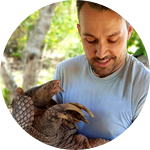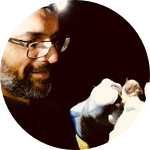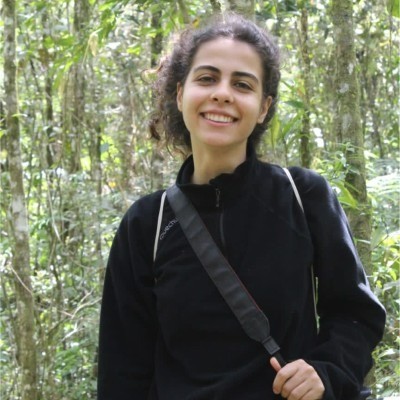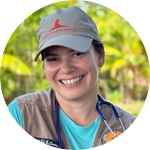About This Project
Infectious diseases like canine distemper virus (CDV) threaten wildlife, causing outbreaks with high death rates, especially in canids. Despite this, research on CDV’s population-level effects and outbreak reports in Brazil remains limited. Nearly all Brazilian canid species have been infected with this virus. This project addresses this gap by assessing CDV prevalence in canids using tests and integrating spatial and temporal analyses to support effective control strategies for CDV.
Ask the Scientists
Join The DiscussionWhat is the context of this research?
We know that human activities directly affect biodiversity; and infectious diseases are an emerging cause of wildlife decline and extinction. Among these diseases, the canine distemper virus (CDV) has the potential to cause outbreaks with high mortality rates, especially among carnivores of the Canidae family.
CDV is caused by a virus belonging to the family Paramyxoviridae, genus Morbillivirus. This disease poses a threat to the conservation, being responsible for significant epizootics and severe population declines.
Despite this scenario, there are few studies on population effects in Brazilian canids, and there are no outbreaks recorded in Brazil. However, canids frequently die in institutions that receive wild animals with signs of CDV.
This project aims to evaluate the prevalence and incidence of CDV in free-living populations of Canidae in the Cerrado, including the maned wolf, crab-eating fox, hoary fox, and free-ranging dogs.
What is the significance of this project?
Infectious diseases play a natural role in regulating wildlife populations, but certain pathogens can pose serious threats to conservation, especially when combined with environmental factors such as habitat loss. The presence of domestic animals can intensify this risk by facilitating disease transmission to native species, making comprehensive monitoring of wild and domestic animals in overlapping areas essential.
Effective strategies include epidemiological surveillance, aiming at mitigating pathogen spillovers to promote the protection of biodiversity, animal health, and also public health.
Testing of wild animals for CDV in Brazil is still rare and costly, with a lack of routine laboratories for CDV. Therefore, addressing knowledge gaps, such as in situ monitoring, validation of rapid tests, serological assessments, and interspecific transmission and control strategies, is essential.
What are the goals of the project?
This project aims to determine the prevalence of CDV in Cerrado agroecosystems in Central Brazil by testing wild canid species — crab-eating fox (Cerdocyon thous), maned wolf (Chrysocyon brachyurus), hoary fox (Lycalopex vetulus) — as well domestic dogs (Canis lupus familiaris). We will use retrospective samples collected from a twelve-year longitudinal study in partnership with the Cerrado Mammals Conservation Program (PCMC) and prospective samples from new field collections in areas of Cerrado agroecosystems in the states of Goiás and São Paulo.
These data will be analyzed and overlaid with spatial and temporal information to estimate the potential transmission flows between species in space and time, especially the likelihood of transmission from domestic dogs to wild canids. The results will support the development of strategies for controlling virus spread, if the need for such measures is detected.
Budget
The costs involved include tests for CDV diagnosis. The requested funds will cover the rapid tests for diagnosing the disease.
The cost per box containing 120 tests is $1,458.22. We need to test approximately 600 samples, which would totalize $7,291.
Rapid tests of Immunocomb IMG kit
https://www.vpdiagnostico.shop/diagnosticos/caninos/immunocomb-parvo-cinomose-igm-kit-com-120-testes
Kit 120 units - R$ 8.749,29 - $1.458,215
5 boxes x 120units – $7.290 total
Endorsed by
 Project Timeline
Project Timeline
The project will begin in April 2025, and will use 12-year retrospective samples from the Cerrado Mammal Conservation Program - PCMC. Rapid tests for CDV will be acquired by July 2025. Between August 2025 and December 2025, 4 field expeditions will be carried out to collect samples from wild canids, two in the state of Goiás, one in the state of Minas Gerais, and one in the state of São Paulo. Between January and April 2026, the data obtained will be analyzed.
Mar 10, 2025
Project Launched
Apr 01, 2025
Begin
Jul 01, 2025
Acquired tests for CDV
Aug 01, 2025
Expedition
Sep 01, 2025
Expedition
Meet the Team
Team Bio
Caio Filipi da Motta Lima - http://lattes.cnpq.br/58333990...
Isis das Candeias - http://lattes.cnpq.br/56019952...
Maria Atalla Belloti
Veterinarian and master's student in the Animal Bioscience graduate program at the University of São Paulo (USP/FZEA), in the Laboratory of Medicine and Conservation (LaMeC). Project "Eco-epidemiological Study of Canine Distemper Virus in Wild Canids and Domestic Dogs in the Brazilian Cerrado" and is conducted in partnership with the Cerrado Mammal Conservation Program (PCMC).
Isis Candeias
Veterinarian and associate researcher of the Cerrado Mammals' Conservation Program (PCMC) with the following research lines: One Health, Reproductive Biology; Chronobiology, with an emphasis on wild canids.
Caio Filipe da Motta Lima
Veterinarian with Ph.D. in Epidemiology from University of São Paulo, with a Doctoral Exchange Program at the University of Minnesota (USA). Worked as veterinarian and researcher at São Paulo Zoo (2011-2021). He is currently a Professor at the University of São Paulo; Researcher at the Cerrado Mammals Coservation Program (since 2012); Member of the Conservation Planning Specialist Group (IUCN-SSC-CPSG); Professor in the Postgraduate Program in Wildlife Conservation Federal University of São Carlos. Colaborates with the elaboration of public policies at state and federal levels. Areas of interest: Wildlife medicine and management; Conservation Medicine and One Health, with emphasis in the interface between wild and domestic carnivores; Animal Ecology, with emphasis in Movement Ecology; and Strategic Planning for Conservation.
Lab Notes
Nothing posted yet.
Project Backers
- 33Backers
- 5%Funded
- $358Total Donations
- $10.85Average Donation










